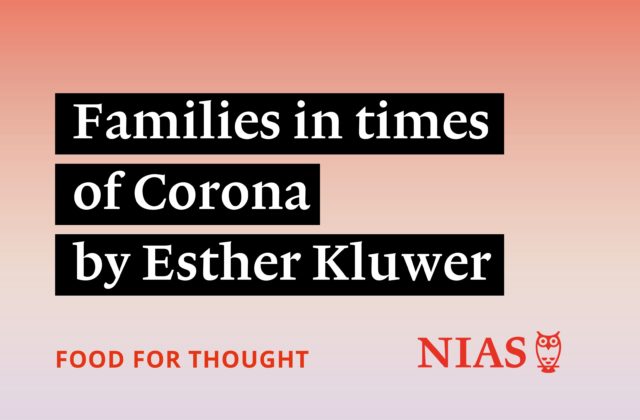My co-fellow Luigi Correas in his article ‘Humanity at Home’ pointed out that the familiar home, where we can retreat with warm reminiscences only exists under conditions of security provided by a political community. While that is largely true for countries like the Netherlands, where the government can provide extensive relief packages for citizens who experience a loss of income so that bills can continue to be paid, the idea of home can be both familiar and threatening.
At this moment millions of families are at home because of the Corona crisis. Work, school and private life have to be combined at the same location and at the same time, and family members are stuck together 24/7 with much less space than usual. Add to this the uncertainty about the course of the pandemic, and possibly illness or unemployment, and stress levels can increase considerably.
Stress on the family system can lead to solidarity or instability. We see countless examples of people joining forces and finding creative solutions to tackle the recently emerged problems. Our innate attachment needs, to be together and care for each other, are fueled under external threat. At the same time, stress can also disrupt the system so that it becomes unstable. Stress leads to more irritation, aggression and conflict. Partners and parents under stress are less attentive and less likely to respond in calm and constructive ways. Irritations and disagreements can easily escalate as a result. An illustration of the dualistic effect of stress from an “exogenous shock” is research showing that the devastating hurricane Hugo in the 1980s was followed by a peak in both marriage and divorce rates.
Crucial is for whom the current situation leads to an instable family system. The answer is as simple as it is unsettling. Families that experience more stress, for example due to unemployment or illness, are at greater risk of instability. This also applies to families who have fewer (material and immaterial) resources at their disposal. Families that already suffered from financial hardship or relationship problems before Corona broke out. It is the sum of these factors that turns a stressful situation at home into an instable crisis situation.
The unsettling truth is that vulnerable families face a double burden under the current circumstances. Not only does the family system become (even) more unstable, but the essential support from family, friends and professionals is also less accessible. Social support, as well as social control, has decreased and professionals have more difficulty to, literally, get behind their front door. Vulnerable families can easily disappear from the radar now that neighbors, relatives, teachers and professionals are forced to keep their distance.
Most families are resilient and will be able to deal with the current situation. They may experience difficulties but they are sufficiently equipped to meet the challenges. Vulnerable families are not. They need extra care and attention at this time. Increases in domestic violence, child abuse, and (high-conflict) divorce are a real threat. Although attention is currently, quite rightly, focused on the care of the sick, the protection of the elderly, and the capacity of the healthcare system, we should not lose sight of vulnerable families and the social and psychological care providers who are needed to help them.
Information for parents, children, professionals and municipalities: www.nji.nl/coronavirus
Advice and reporting center for domestic violence and child abuse: www.veiligthuis.nl




